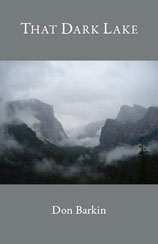 Review of That Dark Lake
by Don Barkin
Antrim House, $19
Review of That Dark Lake
by Don Barkin
Antrim House, $19
The misty mountains that grace the cover of Don Barkin’s That Dark Lake suggest what lies within this collection of poetry. It also bespeaks the atmosphere that pervades the sensibility of this New Haven poet. Barkin’s work is divided into four sections, each with its unique character, which at times creates a dissonance that can be either welcoming or off-putting by virtue of their congruity.
The energy that underwrites the collection, modified, as it were, by that darkness, is evident in poems like“Eighteen”:
In Springtime a young brook throws the whole mountain in an uproar.
It crashes through the rocks like a blind man in a hurry. Its froth leaps like a stallion’s spit in terror of the bridle.
Don’t get upset. Think of the day when you’ll smile a little sadly as the brook disappears in the sea’s grey suit.
At the age when in Western society, a child becomes an adult, Barkin captures the cusp of that transition through the liquid metaphors of “brook” and “froth” and “spit,” whose vigor dissipate into the grey stream of adulthood. In this respect, many of Barkin‘s poems bear the linguistic stamp of modernists like William Carlos Williams, who could capture and even subjugate readers’ hearts and minds with a few, simple words.
Sometimes Barkin constrains this rare prowess by letting stringent rhyme schemes tie down his lyrical, even chaste gems of insight. Fortunately this is not omnipresent, and many of the poems reflect the sincere, almost affable ambience, of That Dark Lake as a whole. The collection delves not just into human emotion but the everyday bustle of life. Experience serves as root and cause of all artistic experience in the world, that “lonely hour of the single light bulb,” as Barkin frames it. Consider such lines as
In the weight of the great trees on the lawn, In the timid, curving love Of the tree limbs on the bright grass, They can see that really Nothing ever goes anywhere
or
In middle age you smell the end The way you smell the snow …
Paradigms of innocence possibly lost suffuse Barkin’s voice. In the smallness of things lies the greatness of reality, of Being itself. And yet, the collection is domestically minded enough to grasp the solace offered--as this collections offers--mental creature comforts: a good book to pick up after a day of “rush[ing] off, then com[ing] back…walking in too fast” and listening to the “office women” gossip. It’s a book meant to slow you down, to remind you that “out there / water flows somewhere / and the quiet people rule.”